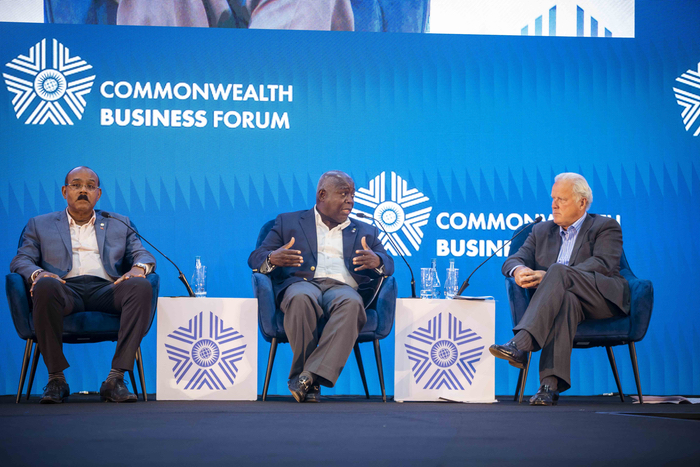
Mitigating the effects of climate change and enhancing the use of technology to improve livelihoods are two of the topics that took centre stage on the second day of the ongoing 2022 Commonwealth Business Forum (CBF 2022) in Kigali.
Participants deliberated during the various sessions of the day, noting that members of the Commonwealth member states needed to take action either through policy recommendations or advocacy in ensuring the world tackles some of the current and looming crises such as pandemics and climate change.
Opening the day’s first plenary session, Uganda’s First Deputy Prime Minister, Rt. Hon. Rebecca Kadaga stressed the need for redesigning global value chains for a post Covid world.
“The pandemic illuminated pre-existing underlying fragilities of global value chains, strengthening the demand for more localised resilient and agile value chains to manufacture products customised to local needs.”
Hon. Kadaga set the scene for two panels that focused on ecosystem enablers for redesigning value chains in sectors like agriculture, and the impact of the Covid-19 pandemic on manufacturing and how to manage future disruptions.
Later during the day, the Prime Minister of Jamaica, Rt. Hon. Andrew Michael Holness addressed participants of the forum on the need to bridge the digital divide within the Commonwealth.
“I believe now that we have not just the technology to make lives better, but we have the understanding of governance and equity. One of the priorities of the Commonwealth must be to promote and accelerate the digital development of all members particularly in areas of governance and regulation,” he noted.
Following the session opened by the Jamaican Prime Minister, was the last plenary of the day which was led by the Prime Ministers of Bahamas and Antigua & Barbuda – Rt. Hon. Philip Davis and Rt. Hon. Gaston Browne respectively.
The two Prime Ministers advocated for countries in the Commonwealth to support the call for a more sustainable planet through more cohesive partnerships between governments, organisations, policy makers, and the private sector in fighting climate change.
They highlighted how small states, Least Developed Countries and other vulnerable countries face acute impacts of climate change in a disproportionate way compared to more industrialised countries.
“The negative impact of climate change remains the most fundamental existential threat, but that threat is not evenly spread. Those of us least responsible for the carbon emissions which drive climate change are suffering from the gravest negative impacts,” Rt. Hon. Davis explained.
On his part, Rt. Hon. Browne noted:
“If there’s one message I want to deliver to you today is that small states require your advocacy and support. We are suffering disproportionately from the impact of climate change, which is primarily due to the burning of fossil fuels by industrialised countries. I’m of the view of a global windfall tax on the profits all these companies are making because they’re doing untold damage to our planet. If we don’t make it difficult for them to operate and transition into green energy then it will never stop.”
Lord Marland, Chair of the Commonwealth Enterprise and Investment Council (CWEIC) then moderated a fireside chat with the two prime ministers on how countries like the Bahamas and Antigua & Barbuda can use green financing solutions such as ‘The Commonwealth Green Finance Facility’ to use their size and agility to accelerate their uptake of Nature Based Solutions, and transform their reliance on tourism and shipping into blue-green growth.
Over 1,500 delegates from Commonwealth member states are attending the forum, mainly government leaders, business executives, leaders of global and regional development institutions, young entrepreneurs and representatives of trade and investment organisations.
The day featured other plenaries, think tanks, and breakout sessions that explored global challenges and proposed solutions.
Today is the last day of the forum which will close with a Heads of State and CEOs roundtable discussion where several Commonwealth leaders who have come to Rwanda will reaffirm their common values and agree actions and policies to improve the lives of all their citizens. (End)
